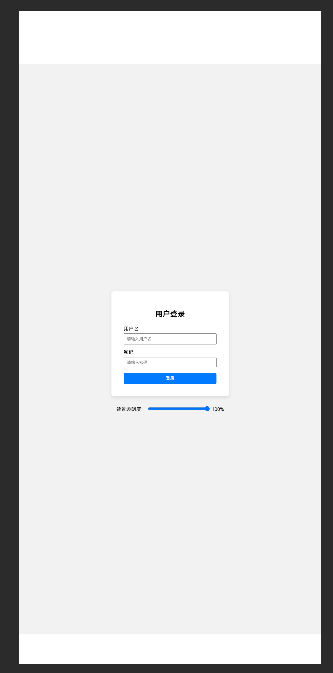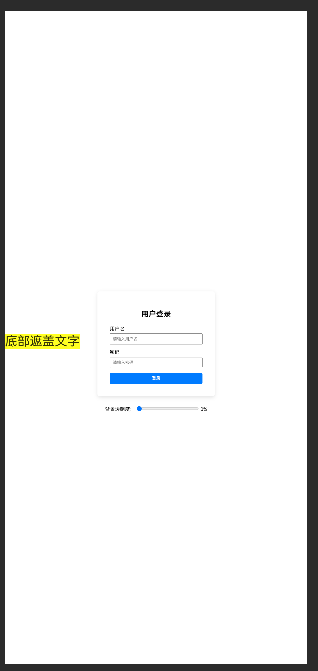HarmonyOS鸿蒙Next中使用Web组件加载本地网页怎么使得背景透明
HarmonyOS鸿蒙Next中使用Web组件加载本地网页怎么使得背景透明 如题,想要使背景透明如何操作
6 回复
实现Web组件加载本地网页的背景透明,需要同时处理ArkUI容器和Web内容层的透明设置。楼主参照以下示例试试:
// index.ets
import { webview } from '@kit.ArkWeb';
struct TransparentWebPage {
controller: webview.WebviewController = new webview.WebviewController();
build() {
Column() {
Web({
src: $rawfile("transparent.html"),
controller: this.controller
})
.width('100%')
.height('100%')
.backgroundColor(Color.Transparent)
}
.backgroundColor(Color.Transparent)
.opacity(1)
}
}
<!-- transparent.html -->
<!DOCTYPE html>
<html style="background-color:transparent">
<head>
<link rel="stylesheet" href="resource://rawfile/transparent.css">
</head>
<body>
<p>透明背景内容</p>
</body>
</html>
更多关于HarmonyOS鸿蒙Next中使用Web组件加载本地网页怎么使得背景透明的实战系列教程也可以访问 https://www.itying.com/category-93-b0.html
我写了一个demo楼主可以参考一下:
- 实现思路:
- 将鸿蒙端组件背景色透明度改为0,再改变网页的透明度来实现将网页背景色变为0使整个web层透明
- 如果要改变其他网页的背景色通过runJavaScript来实现
不透明时:

完全透明时,遮盖文字露出:

2. 鸿蒙端代码:
```typescript
import { webview } from '[@kit](/user/kit).ArkWeb';
import { LogUtil } from '../common/util/LogUtil';
const TAG: string = 'MusicWeb'
[@Component](/user/Component)
struct WebPage {
controller: webview.WebviewController = new webview.WebviewController();
customUserAgent: string =
'Mozilla/5.0 (Windows NT 10.0; Win64; x64) AppleWebKit/537.36 (KHTML, like Gecko) Chrome/132.0.0.0 Safari/537.36'
url: string = ''
build() {
Stack() {
Text('底部遮盖文字')
.backgroundColor('#ff2')
Column() {
Web({
src: $rawfile('Index.html'),
controller: this.controller
})
.backgroundColor('#00f8f8f6')
.zoomAccess(false)
.metaViewport(true)
.onlineImageAccess(true)
.javaScriptAccess(true)
.domStorageAccess(true)
.databaseAccess(true)
.horizontalScrollBarAccess(false)
.verticalScrollBarAccess(false)
.geolocationAccess(true)
.multiWindowAccess(false)
.allowWindowOpenMethod(false)
.mixedMode(MixedMode.All)
.darkMode(WebDarkMode.Off)//开启网页深色模式
.onGeolocationShow((event: OnGeolocationShowEvent) => {
event.geolocation.invoke(event.origin, true, true)
// this.viewModel.locationStateManage()
})
.onPageBegin((event) => {
// this.viewModel.setLoadingProgress(0,true)
LogUtil.i(TAG, "onPageBegin", event)
})
.onProgressChange((event) => {
// this.viewModel.setLoadingProgress(event.newProgress)
LogUtil.i(TAG, "onProgressChange", event.newProgress)
})
.onPageEnd(() => {
// if (this.viewModel.webState != WebState.networkError) {
// this.viewModel.webState = WebState.loadComplete
// }
LogUtil.i(TAG, "onPageEnd")
// 注册对象的名称:jsBridge
// 交互方法名(同步方法):bridgeMethod
// 交互方法名(异步方法):asyncBridgeMethod
// 交互的数据类型统一为json对象或者json字符串
// {
// "bridgeCode": 1,//js调用app方法时返回的状态码,1代表成功,0代表失败,比如登录交互,1:登录成功,0:登录失败
// "bridgeData": {"userName": "xxx","pwd": "xxx"},//js调用app方法传递的参数
// "appMethodName": "login",//js调用app的方法名
// "jsMethodName": "test",//app回调js的方法名
// "bridgeFlagData": {}//js调用app方法时传递的参数,app回调js方法时原封不动传递给js
// }
// if(this.pageEndScript){
// this.config.controller?.runJavaScript(this.pageEndScript)
// }
})
.onGeolocationHide(() => {
// Toast.show('用户未同意获取地理位置信息!')
// LogUtil.w(this.Tag, 'onGeolocationHide', '获取地理位置弹窗被取消')
})
.onControllerAttached(() => {
// this.isControllerAttached = true
try {
webview.WebCookieManager.putAcceptCookieEnabled(true)
webview.WebCookieManager.putAcceptThirdPartyCookieEnabled(true)
} catch (err) {
}
// TODO: 这2个api可能造成闪退, 先关闭
// this.controller?.enableAdsBlock(true) //暂时先开启
// this.controller?.enableSafeBrowsing(true)
this.controller?.setCustomUserAgent(this.customUserAgent)
if (this.controller) {
/* this.schemeHandler = new HttpsSchemeHandler(this.config.controller)
this.schemeHandler.addHandler(new ServiceWorkSchemeHandler('FControllerAttached'))*/
// this.controller.setWebSchemeHandler('https', this.schemeHandler);
}
})
.onErrorReceive((event) => {
if (event) {
LogUtil.i(TAG, 'getErrorInfo:' + event.error.getErrorInfo());
LogUtil.i(TAG, 'getErrorCode:' + event.error.getErrorCode());
LogUtil.i(TAG, 'url:' + event.request.getRequestUrl());
LogUtil.i(TAG, 'isMainFrame:' + event.request.isMainFrame());
LogUtil.i(TAG, 'isRedirect:' + event.request.isRedirect());
}
})
.width('100%')
.height('100%')
}
.padding({ top: 30, bottom: 10 })
.width('100%')
.height('100%')
.backgroundColor('#00f8f8f6')
}
.alignContent(Alignment.Start)
.width('100%')
.height('100%')
}
}
- Index.html, demo代码:
<!DOCTYPE html>
<html lang="en">
<head>
<meta charset="UTF-8">
<title>登录页面</title>
<style>
body {
font-family: Arial, sans-serif;
background: rgba(242, 242, 242, 1); /* 使用 rgba 支持透明度 */
display: flex;
justify-content: center;
align-items: center;
height: 100vh;
flex-direction: column;
transition: background 0.3s ease;
}
.login-container {
background: #fff;
padding: 40px;
border-radius: 8px;
box-shadow: 0 4px 12px rgba(0, 0, 0, 0.1);
width: 300px;
}
.login-container h2 {
text-align: center;
margin-bottom: 24px;
}
.form-group {
margin-bottom: 16px;
}
.form-group label {
display: block;
margin-bottom: 6px;
}
.form-group input {
width: 100%;
padding: 8px;
box-sizing: border-box;
}
.login-button {
width: 100%;
padding: 10px;
background: #007bff;
border: none;
color: white;
font-weight: bold;
border-radius: 4px;
cursor: pointer;
}
.login-button:hover {
background: #0056b3;
}
.error {
color: red;
font-size: 14px;
text-align: center;
display: none;
}
.opacity-slider-container {
margin-top: 30px;
text-align: center;
}
.opacity-slider-container input {
width: 200px;
}
</style>
</head>
<body>
<div class="login-container">
<h2>用户登录</h2>
<div class="form-group">
<label for="username">用户名</label>
<input id="username" placeholder="请输入用户名" type="text">
</div>
<div class="form-group">
<label for="password">密码</label>
<input id="password" placeholder="请输入密码" type="password">
</div>
<div class="error" id="errorMsg">请输入用户名和密码</div>
<button class="login-button" onclick="handleLogin()">登录</button>
</div>
<!-- ✅ 新增:透明度控制滑块 -->
<div class="opacity-slider-container">
<label for="opacitySlider">背景透明度:</label>
<input id="opacitySlider" max="100" min="0" type="range" value="100">
<span id="opacityValue">100%</span>
</div>
<script>
function handleLogin() {
const username = document.getElementById('username').value.trim();
const password = document.getElementById('password').value.trim();
const errorMsg = document.getElementById('errorMsg');
if (!username || !password) {
errorMsg.style.display = 'block';
return;
}
errorMsg.style.display = 'none';
// 模拟提交请求
alert(`用户名:${username}\n密码:${password}`);
}
// ✅ 新增:监听滑块调整背景透明度
const slider = document.getElementById('opacitySlider');
const valueLabel = document.getElementById('opacityValue');
slider.addEventListener('input', (e) => {
const percent = e.target.value;
const alpha = percent / 100;
document.body.style.background = `rgba(242, 242, 242, ${alpha})`;
valueLabel.textContent = `${percent}%`;
});
</script>
</body>
</html>
在 HarmonyOS 的 ArkTS 中,使用 Web 组件加载本地网页并实现背景透明,需要同时配置 Web 组件本身 和 本地网页的 CSS 样式,确保两层背景都设置为透明。
在HarmonyOS Next中,要使Web组件加载的本地网页背景透明,需要在ArkUI和网页端同时设置:
- ArkUI端:
Web({ src: $rawfile('local.html') })
.backgroundColor(Color.Transparent)
.webController(controller)
- HTML端需添加:
<style>
body {
background-color: transparent !important;
}
</style>
同时确保网页内容没有不透明元素覆盖。此方法仅适用于本地网页加载场景。
在HarmonyOS Next中使Web组件背景透明,可以通过以下方式实现:
- 在Web组件的布局文件中设置透明背景:
<Web
...
ohos:background_element="#00000000"
/>
- 在网页端CSS中添加透明样式:
body {
background-color: transparent !important;
}
- 代码中动态设置透明度:
webController.setTransparent(true); // 通过WebController设置
注意:需要确保网页内容本身支持透明效果,部分网页可能自带背景色会覆盖透明设置。







